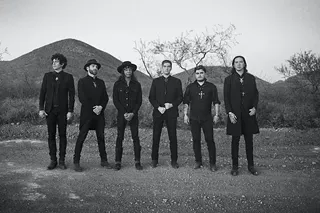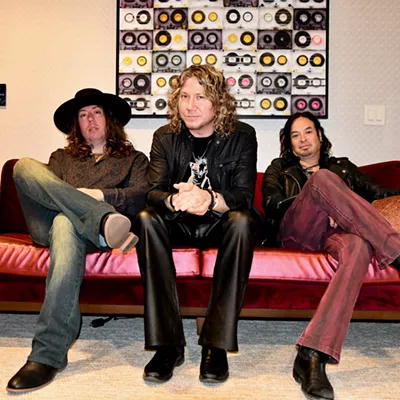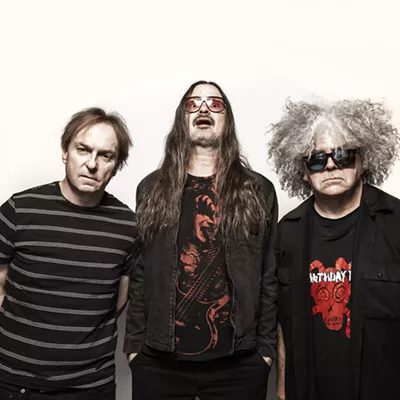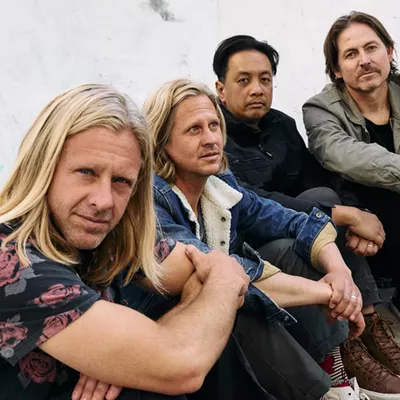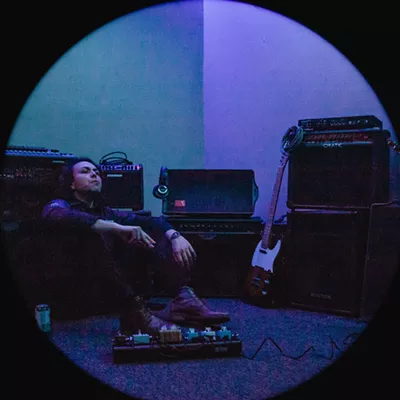Tucson's XIXA have an expert grasp on the disorienting borderlands they call home. The psychedelic sextet maps the "New Southwest" with their unique fusion of cumbia, desert rock, tejano and gothic aesthetics. And while their debut album Bloodline captured the physical elements of the borderlands, their new album Genesis captures the metaphysical.
This is clear from the album artwork. Whereas 2016's Bloodline features a dusky desert landscape, Genesis removes the physicality, instead opting for a dark mandala of alchemy symbols, occult references, UFOs and mysticism. The place Sonoran outlaws once roamed now houses ghosts and portals. But this is not to say Genesis is intangible, in fact, it's the most complete XIXA has ever sounded.
"The main difference between Bloodline and Genesis is that we were so much more comfortable as a band. We knew how to work with each other," says vocalist and guitarist Gabriel Sullivan. "Those first sessions were just a month of writing and sketching. By the end of it, there were 25 tracks we had sketched out. From there, Brian [Lopez] and I went in and honed each song, restructured them, put the icing on the cake... To me, this is the finest representation we've come up with so far for what our band is and what we represent. It's the most focused we've all been in creating a record."
XIXA began recording the album in 2018 at their own Dust & Stone Recording Studio here in Tucson. Sullivan says those sessions would sometimes see the band recording eight hours a day, Monday through Friday, detailing the minutiae of every track.
Guitarist and vocalist Brian Lopez says the band was still trying to solidify their sound on their first album—at that time only recently forming XIXA from the cover band Chicha Dust. However, that early "stumbling around" and "pushing and pulling each other's musical tastes" was ironed out over years of touring, including an invitation to SXSW. Going into Genesis, their style was honed.
"Those sessions, there were times when all of us were in the room, or just two or three," Lopez said. "Sometimes it would start with an idea Gabe or myself brought in, and we'd work on it. Or, we'd just pull it out of thin air if we were inspired. Luckily, we found out that was a good flow for us."
Lopez and Sullivan were joined by Jason Urman on the keyboard, Winston Watson on the drums, Efrén Cruz Chávez on timbales and additional percussion, and Hikit Corbel on bass.
The album's lead single, "Genesis of Gaea," features a dark yet surfy guitar line fit inside their signature Latin American rhythms. For how driving it is, the track has a real sense of space. Sullivan's smoky voice only adds to that expanse as he cryptically sings, "Sweet little child, there's no place for you here / They're onto you now, yes the walls are closing in / You curse the design, and her devious sleight of hand / Like water from wine, placed back in the land."
One of the largest differences on Genesis is the greater role of electronic instruments, a fusion hinted at on their 2019 EP The Code, written during the same sessions. Tracks like "Soma"—a clear standout on the album—begin as a noisy rock track before turning inside out into a march of shimmering phasers, busy effects and soaring vocal harmonies not unlike the Flaming Lips. In many ways, the increased electronics reflect the album's aesthetic, moving away from the grounded desert styles in favor of ethereal layering.
"In my mind, when we're in the production mode, the acoustic and woodwind instruments definitely represent earth and sand and a grounded style. And by adding these electronic elements, it takes the music to where it becomes otherworldly and goes beyond that traditional songwriting mindset," Sullivan said. "We really honed that in on Genesis."
Frontmen Lopez and Sullivan each have deep solo catalogs (Sullivan having released the great Black Crow in 2019), and say their personal music influences and inspires XIXA as well. However, rather than sticking to the solo singer/songwriter template, XIXA instead performs like a "jam band getting high on Diá de Los Muertos."
"Brian and I, in our solo songs, we might be leaning more toward direct lyrical content and story-based songs. But writing together, we quickly realized that with XIXA we were making these more open-ended songs with a certain aesthetic and imagery," Sullivan said.
Genesis also features a variety of guest performers, including Greenland's Uummannaq Children's Choir and the African quintet Imarhan (also featured on Bloodline), who transform the track "Eve of Agnes" into frantic, tribal groove jumping between hushed vocals and hypnotic chants.
"Having our own studio, we have so much at our disposal," Lopez said. "We know how to get so many different sounds it's actually important for us to put a cap on the spectrum of sounds we want to go for, otherwise it gets too overwhelming. Gabe is like a sponge. He'll come in and know how to do something after looking at a tutorial for a few seconds and run with it. And I've found my job is to let Gabe go, until it goes too far, and then we find that sweet spot."
Due to COVID, the album's release was postponed twice. However, this allowed them to reflect on the album as a whole, and they wound up reordering some of the tracklist. According to Sullivan, the album was "100% structured as a vinyl" and the band used that physical format as their "north star" when deciding the track listing. As such, the A side ends with the warping "Soma," and immediately picks up the energy with "Eve of Agnes" opening the B side.
Lopez says in the Genesis sessions, the band wanted to push what their songwriting was, and looking back, even what the Americana style can be. Needless to say, they succeeded. If Americana is a group of musicians sitting in a circle and sharing songs on the acoustic guitar, XIXA turn those instruments into a bonfire and dance around the flames while howling at the night sky.

